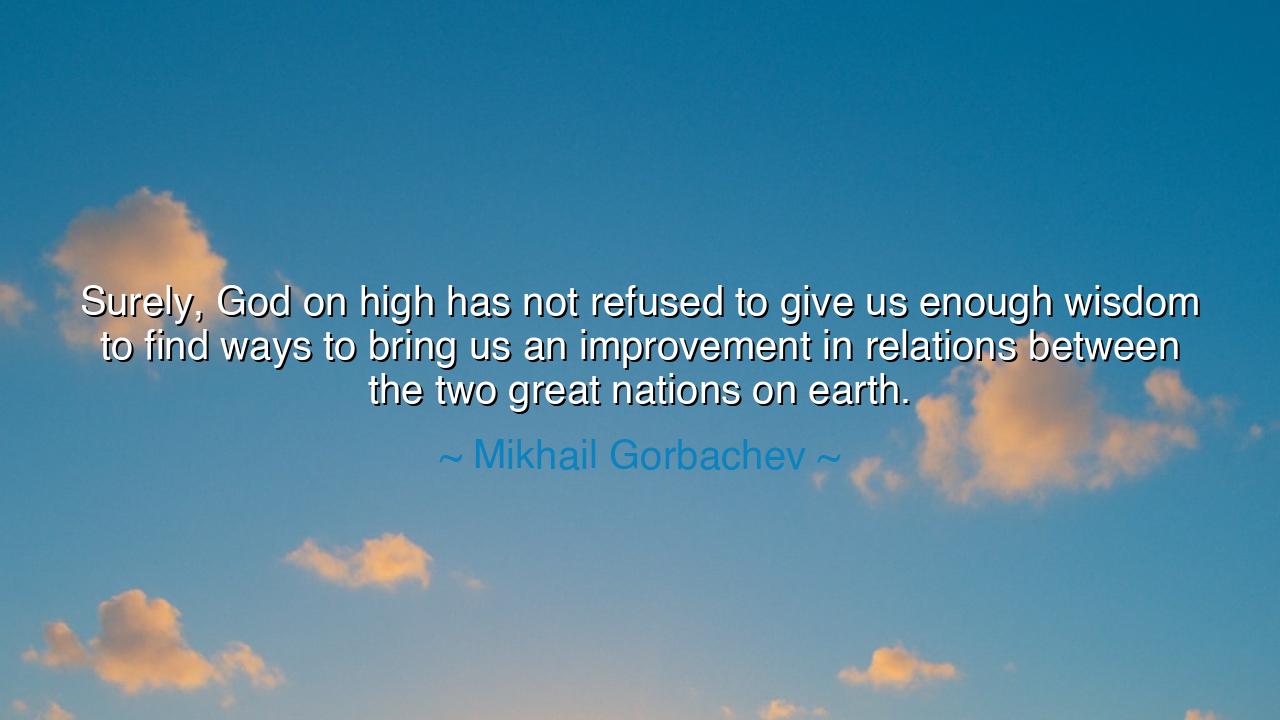
Surely, God on high has not refused to give us enough wisdom to
Surely, God on high has not refused to give us enough wisdom to find ways to bring us an improvement in relations between the two great nations on earth.






Hearken, O seeker of wisdom, to the words of Mikhail Gorbachev, who in the twilight of a divided world spoke of hope and the divine measure of human understanding. In the shadow of towers armed with fire and the silent dread of mistrust, he called upon the hearts of men to seek wisdom granted from the heights, that enmity might yield to improvement, and that the great nations, long bound in suspicion, might find a path to harmony. Here is a teaching for generations: even amidst the storms of power and ambition, the spirit of man is not abandoned by the divine, nor is the capacity for reconciliation denied.
Consider the origin of this utterance, born in the era when the Cold War hung heavy over the earth. The Soviet Union and the United States, two titans, stood in opposition as if in a cosmic duel, their every move watched, their every word laden with tension. Gorbachev, the last steward of a waning empire, perceived that the survival of humankind rested not in the sharpened edge of the sword, but in the cultivation of diplomacy and mutual respect. He invoked God, not as a symbol of fear, but as a witness to mankind’s potential for prudence and foresight, as if to remind all that human minds are endowed with faculties sufficient to bridge even the deepest divides.
The meaning of his words reaches beyond politics into the very soul of human endeavor. It is a reminder that wisdom—patient, discerning, generous—is the tool by which rivalry may be softened into collaboration. It teaches that the divine spark within humanity is sufficient, if we dare to cultivate it, to reshape history’s course. As rivers carve valleys through stone, so too can thoughtful discourse and humility carve the path to understanding, even between the most entrenched adversaries.
One may recall the historic summits with Ronald Reagan, when Gorbachev’s resolve for dialogue culminated in treaties that reduced nuclear arsenals and dismantled barriers of fear. The Intermediate-Range Nuclear Forces Treaty became a testament to the principle that human beings, guided by reason and conscience, can achieve feats once deemed impossible. Through these acts, he demonstrated that even amidst the machinery of war, the quiet strength of wisdom and moral courage can prevail.
Let the generations who come after us remember: the words of Gorbachev are a scroll of counsel. They tell us that no nation is too great, no history too burdened, to seek improvement in the bonds of friendship and understanding. That which divides can be mended by minds and hearts guided by the light of prudence, and that the divine endowment of wisdom is sufficient for those who seek it.
Thus, O children of the future, treasure this truth: in the meeting of powers, in the arena of global consequence, do not despair. For the Almighty has not withheld from us the capacity for insight, and the diligent, the courageous, the patient, may yet turn rivalry into concord, and sorrow into legacy of peace.






Nnhattrinh
This quote makes me think about the intersection of morality, faith, and politics. It assumes that divine providence has equipped humans with the capacity to resolve conflicts, which is comforting, but it also raises practical questions: how can wisdom be translated into actionable policy? Are negotiations between major powers more influenced by ethical reasoning or by strategic advantage? I wonder whether the challenge lies in harnessing human wisdom collectively or in aligning the interests of powerful nations.
LALam Anh
Reading this, I feel both inspired and skeptical. The idea that wisdom can guide nations toward cooperation is appealing, yet history shows repeated cycles of conflict despite such hopes. Does this imply that Gorbachev’s statement is aspirational rhetoric, or does it reflect a genuine belief that diplomacy can succeed when leaders exercise thoughtful judgment? It makes me consider how citizens, advisors, and international institutions can support or hinder the exercise of wisdom in global decision-making.
KMkylian mbappe
This perspective provokes reflection on the role of individual leadership in international affairs. If wisdom is the key to improving relations between nations, what qualities or practices best cultivate it? Can visionary leadership outweigh systemic barriers, or is the hope for improvement mostly aspirational? I also question whether appeals to shared human values, like morality or divine guidance, carry significant weight in high-stakes diplomacy, or if pragmatic policy and power dynamics dominate outcomes.
VVinh
I feel a sense of cautious optimism reading this. It seems to imply that diplomacy and reason are accessible if leaders apply their wisdom effectively. But it also raises a concern: can we rely on the good intentions of those in power when strategic or economic interests often conflict with the goal of improved relations? I wonder how much faith we should place in moral arguments versus structured negotiation frameworks to achieve meaningful progress.
KLKhoa Luu
This statement strikes me as hopeful but also challenging. It suggests a belief in the possibility of diplomatic progress between major powers, but I wonder how much of such improvement depends on human wisdom versus geopolitical realities. Can goodwill and negotiation overcome entrenched national interests, historical grievances, and domestic pressures? It also makes me curious about what practical steps might be taken to foster mutual understanding and collaboration, and whether moral or ethical appeals can realistically influence global politics.